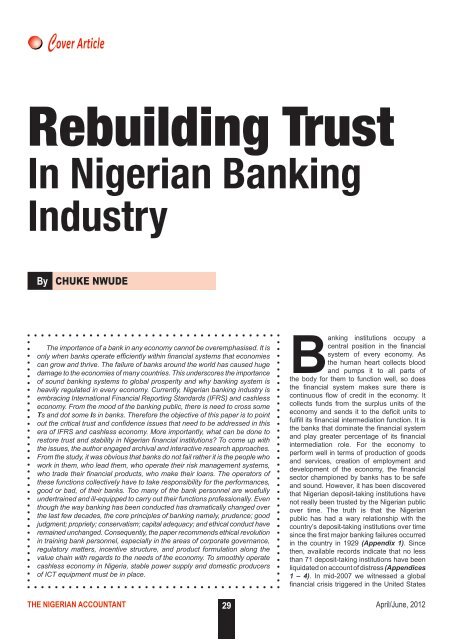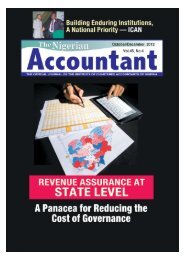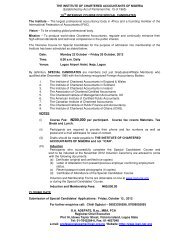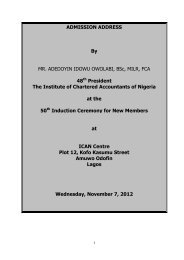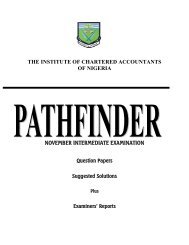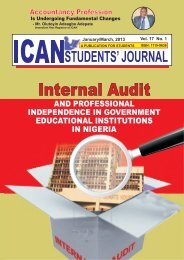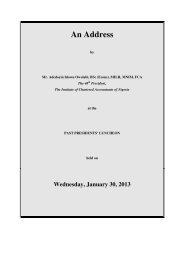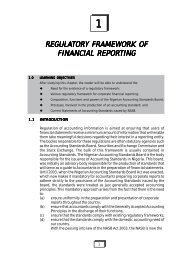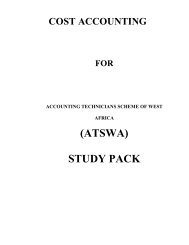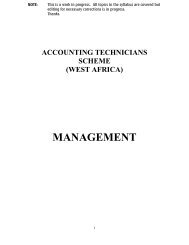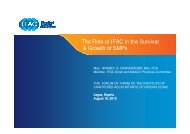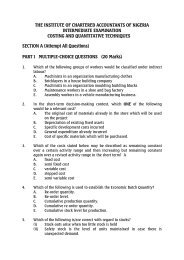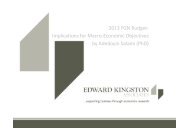The Nigerian Accountant 2012 - The Institute of Chartered ...
The Nigerian Accountant 2012 - The Institute of Chartered ...
The Nigerian Accountant 2012 - The Institute of Chartered ...
You also want an ePaper? Increase the reach of your titles
YUMPU automatically turns print PDFs into web optimized ePapers that Google loves.
Cover Article<br />
Rebuilding Trust<br />
In <strong>Nigerian</strong> Banking<br />
Industry<br />
By CHUKE NWUDE<br />
<strong>The</strong> importance <strong>of</strong> a bank in any economy cannot be overemphasised. It is<br />
only when banks operate efficiently within financial systems that economies<br />
can grow and thrive. <strong>The</strong> failure <strong>of</strong> banks around the world has caused huge<br />
damage to the economies <strong>of</strong> many countries. This underscores the importance<br />
<strong>of</strong> sound banking systems to global prosperity and why banking system is<br />
heavily regulated in every economy. Currently, <strong>Nigerian</strong> banking industry is<br />
embracing International Financial Reporting Standards (IFRS) and cashless<br />
economy. From the mood <strong>of</strong> the banking public, there is need to cross some<br />
Ts and dot some Is in banks. <strong>The</strong>refore the objective <strong>of</strong> this paper is to point<br />
out the critical trust and confidence issues that need to be addressed in this<br />
era <strong>of</strong> IFRS and cashless economy. More importantly, what can be done to<br />
restore trust and stability in <strong>Nigerian</strong> financial institutions? To come up with<br />
the issues, the author engaged archival and interactive research approaches.<br />
From the study, it was obvious that banks do not fail rather it is the people who<br />
work in them, who lead them, who operate their risk management systems,<br />
who trade their financial products, who make their loans. <strong>The</strong> operators <strong>of</strong><br />
these functions collectively have to take responsibility for the performances,<br />
good or bad, <strong>of</strong> their banks. Too many <strong>of</strong> the bank personnel are woefully<br />
undertrained and ill-equipped to carry out their functions pr<strong>of</strong>essionally. Even<br />
though the way banking has been conducted has dramatically changed over<br />
the last few decades, the core principles <strong>of</strong> banking namely, prudence; good<br />
judgment; propriety; conservatism; capital adequacy; and ethical conduct have<br />
remained unchanged. Consequently, the paper recommends ethical revolution<br />
in training bank personnel, especially in the areas <strong>of</strong> corporate governance,<br />
regulatory matters, incentive structure, and product formulation along the<br />
value chain with regards to the needs <strong>of</strong> the economy. To smoothly operate<br />
cashless economy in Nigeria, stable power supply and domestic producers<br />
<strong>of</strong> ICT equipment must be in place.<br />
Banking institutions occupy a<br />
central position in the financial<br />
system <strong>of</strong> every economy. As<br />
the human heart collects blood<br />
and pumps it to all parts <strong>of</strong><br />
the body for them to function well, so does<br />
the financial system makes sure there is<br />
continuous flow <strong>of</strong> credit in the economy. It<br />
collects funds from the surplus units <strong>of</strong> the<br />
economy and sends it to the deficit units to<br />
fulfill its financial intermediation function. It is<br />
the banks that dominate the financial system<br />
and play greater percentage <strong>of</strong> its financial<br />
intermediation role. For the economy to<br />
perform well in terms <strong>of</strong> production <strong>of</strong> goods<br />
and services, creation <strong>of</strong> employment and<br />
development <strong>of</strong> the economy, the financial<br />
sector championed by banks has to be safe<br />
and sound. However, it has been discovered<br />
that <strong>Nigerian</strong> deposit-taking institutions have<br />
not really been trusted by the <strong>Nigerian</strong> public<br />
over time. <strong>The</strong> truth is that the <strong>Nigerian</strong><br />
public has had a wary relationship with the<br />
country’s deposit-taking institutions over time<br />
since the first major banking failures occurred<br />
in the country in 1929 (Appendix 1). Since<br />
then, available records indicate that no less<br />
than 71 deposit-taking institutions have been<br />
liquidated on account <strong>of</strong> distress (Appendices<br />
1 – 4). In mid-2007 we witnessed a global<br />
financial crisis triggered in the United States<br />
THE NIGERIAN ACCOUNTANT 29<br />
April/June, <strong>2012</strong>


